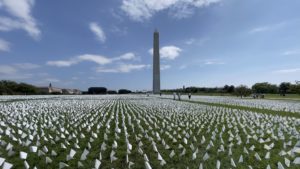In the US in recent weeks there has been a disturbing milestone – over 1 million deaths from COVID-19 – and several tragic events, i.e., mass shootings in New York and Texas. Although quite different in nature, these developments, I believe, highlight central cultural themes in contemporary America related to individual freedom of choice and to attitudes towards authorities, particularly as represented in science and the government. The events are disturbing and tragic but also worrisome in that the power of these cultural themes appears to be growing, with potentially catastrophic future impacts on public health and safety.
A recent article in the NY Times highlighted the fact that Australia’s Covid death rate has been one-tenth of that in the US. The article points to a “lifesaving trait that Australians displayed from the top of government to the hospital floor, and that Americans have shown they lack: trust, in science and institutions, but especially in one another.” That trust, present in Australia, absent in the US, was “fundamental in getting people to change their behavior for the common good to combat Covid, by reducing their movements, wearing masks and getting vaccinated”. While Australians followed community rules, sharing a mutual concern for others (“mateship”), many Americans insisted on their personal freedom not to wear a mask or to get vaccinated. For many in the US that individual freedom of choice trumped all other factors, including social responsibility.
That obsession with personal freedom to act, despite potential dangers to others, is a cultural theme that carries over to gun ownership in the US. There is strong evidence that the widespread lack of restrictions on owning firearms of all types, including military-style assault weapons, leads to more and more gun deaths, including suicides. Efforts at the federal level to institute restrictions have failed repeatedly over the years. At the recent convention of the NRA (National Rifle Association), NRA leaders and attendees responding to the school shooting in Uvalde, Texas, were, according to an article in the Texas Tribune, “unified in their belief that the shooter’s access to guns was not to blame”. Instead they pointed to cultural issues:
They attributed this attack and others to a broader breakdown in society wrought by the removal of God from public schools, the decline of two-parent households, a perceived leniency toward criminals, social media and an increase in mental illness. They described feeling ostracized for their beliefs, and not just those on guns. For their refusal to get the COVID-19 vaccine. For their objections to gay people serving as teachers. For their belief in disciplining children through spanking.
Instead of restricting sales of guns, NRA adherents focused on cultural issues and “framed any attempt at curtailing gun rights as chipping away at their freedoms”. But just like refusing to be vaccinated puts others at risk, the insistence on the absolute freedom to own guns makes them so widely available that it seems inevitable that public safety is at risk, as the raft of mass shootings has shown.
